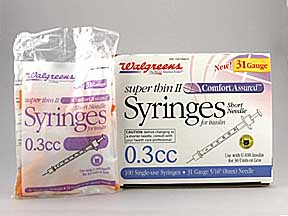
Insulin Syringe Coupons & Savings Card – Discount Prices from $17.39
Our coupons are free to use. Before paying, show the pharmacist your Insulin Syringe savings card to get your free discount. Use our filters below to edit the prescription box to match your needs. The Insulin Syringe prices will update based on your prescription needs. Above our Insulin Syringe coupons, you can change your location to see pharmacy prices and costs in other areas. We're here to help you buy Insulin Syringe at the lowest price with our prescription discount card.
My prescription
Edit
31G X 5/16"0.3 ML, Insulin Syringe (100 Miscellaneous)
Select pharmacy

Albertsons
$17.39
COUPON PRICE
Walgreens
$17.39
COUPON PRICEInsulin Syringe savings card
Show this card to your pharmacist
Albertsons
$17.39
BIN
ID
PCN
GRP
011867
LH6CDC15A6
HT
LABH001
Powered by
Our coupons are free to use. Before paying, show the pharmacist your Insulin Syringe savings card to get your free discount. Use our filters below to edit the prescription box to match your needs. The Insulin Syringe prices will update based on your prescription needs. Above our Insulin Syringe coupons, you can change your location to see pharmacy prices and costs in other areas. We're here to help you buy Insulin Syringe at the lowest price with our prescription discount card.
